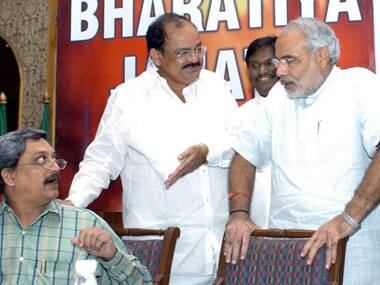In the country’s political trajectory over the past two years, Narendra Modi has rapidly turned into a synonym for divisive. In his scramble to the stratosphere of his own party and popular political opinion, he has left more than just one casualty. First, party patriarch Advani was almost labelled old, selfish, disagreeable and firmly pushed aside. Then, long-time allies JD(U) threw a fit, cried foul and walked out. In a country fed up with the mis-governance, inflation, policy failure and yearning a superhero politician, BJP’s best bet to overthrow the Congress is obviously Modi. However much Sushma Swaraj bays for blood and heads from Pakistan, she cannot fire half a nation’s imagination with girlfriend jokes, like Modi does. In fact, no other BJP politician fits into a hero, anti-hero, any-hero image like Modi does. And like heroes in all successful stories, Modi too needs a friend character. The loyal side-kick who’ll be the first to applaud every achievement. And who’ll have a logical explanation for every faux-pas the hero makes. Modi will find that friend in Goa Chief Minister Manohar Parrikar. [caption id=“attachment_889835” align=“alignleft” width=“380”]
 Parrikar (extreme left) with Narendra Modi (extreme right) at a BJP meet. AFP.[/caption] While Parrikar’s affiliation to Modi’s school of thought is not something new, in the present political climate, his voice counts as more than just lukewarm endorsement. Firstly, in the run-up to the polls and in a party seemingly divided over the choice of its PM candidate, Parrikar’s voice counts. Given that he not just a party functionary and helms another state, Parrikar’s declaration that BJP’s fortunes essentially rides on Modi carries a lot of weight. He
set the ball rolling
in the Goa meet by saying: “Modi can catapult BJP to power. He will take us closer to government formation at the Centre.” Nitish and Advani might whine their hearts out, but Parrikar, whose governance model has been mostly well-received in political narratives, seems to make their objection look petty. It’s the case of one better-than-average state administrator commenting on another. Unlike Advani, a man with depleting relevance, and Nitish, whose state is still festered with development issues, Parrikar in popular consciousness seems more like the man whose opinion matters. Also, his support, doesn’t come across as run-of-the-mill Modi delirium. Take for example, the Walk the Talk interview with The Indian Express editor Shekhar Gupta. Unlike most other supporters who either skirt the 2002 riots issue or defiantly claim Modi shouldn’t be blamed for it one little bit, Parrikar concedes the fact that the Gujarat riots were a terrible case of governance failure. However, he points out, Modi had swiftly gotten his act back together and has set exemplary standards of development. In a country where almost every state and every decade boasts of a shocking case of communal disharmony, that is one explanation that could hold its steam for a long time to come. He says
in the interview
:
Parrikar (extreme left) with Narendra Modi (extreme right) at a BJP meet. AFP.[/caption] While Parrikar’s affiliation to Modi’s school of thought is not something new, in the present political climate, his voice counts as more than just lukewarm endorsement. Firstly, in the run-up to the polls and in a party seemingly divided over the choice of its PM candidate, Parrikar’s voice counts. Given that he not just a party functionary and helms another state, Parrikar’s declaration that BJP’s fortunes essentially rides on Modi carries a lot of weight. He
set the ball rolling
in the Goa meet by saying: “Modi can catapult BJP to power. He will take us closer to government formation at the Centre.” Nitish and Advani might whine their hearts out, but Parrikar, whose governance model has been mostly well-received in political narratives, seems to make their objection look petty. It’s the case of one better-than-average state administrator commenting on another. Unlike Advani, a man with depleting relevance, and Nitish, whose state is still festered with development issues, Parrikar in popular consciousness seems more like the man whose opinion matters. Also, his support, doesn’t come across as run-of-the-mill Modi delirium. Take for example, the Walk the Talk interview with The Indian Express editor Shekhar Gupta. Unlike most other supporters who either skirt the 2002 riots issue or defiantly claim Modi shouldn’t be blamed for it one little bit, Parrikar concedes the fact that the Gujarat riots were a terrible case of governance failure. However, he points out, Modi had swiftly gotten his act back together and has set exemplary standards of development. In a country where almost every state and every decade boasts of a shocking case of communal disharmony, that is one explanation that could hold its steam for a long time to come. He says
in the interview
:
“I will put it as a clear-cut lack of administration and administrative failure, a bad example of governance. This is my personal opinion,” Parikkar said and added that Modi has ensured such incidents did not recur. “How can you say that killing of 2,000 people can be a good example of governance?
Parrikar adds that ’every experience counts’ and hence the Gujarat riots have taught Modi a lesson he will not forget in a hurry. Bolstering his support for Modi, Parrikar cunningly, writes off Advani’s dissent by saying that politicians should retire post 65. ““Politics has become politics of demand. People expect a lot from you. At 65, every politician should take a call and review his health and mental condition,” he says in the interview. It doesn’t take a genius to figure out who he is ticking off. BJP might be still in two minds about declaring Narendra Modi the Prime Ministerial candidate, but with backing like Parrikar’s he might just dispel the confusion soon.
)